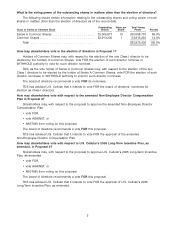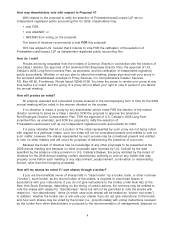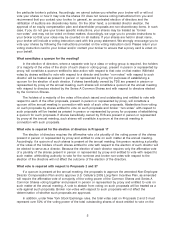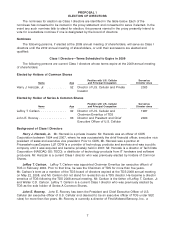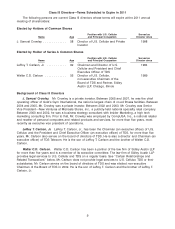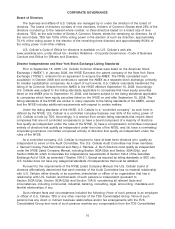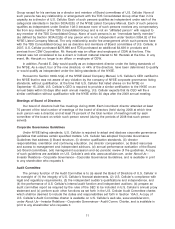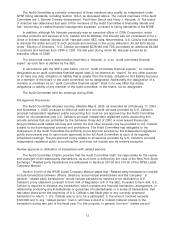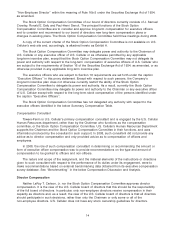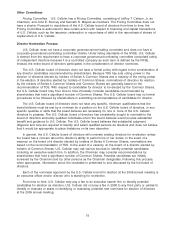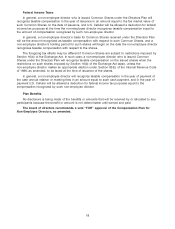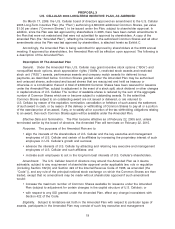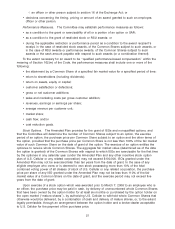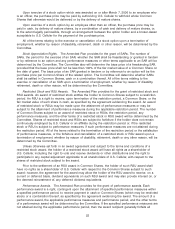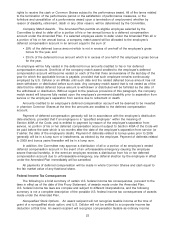US Cellular 2008 Annual Report Download - page 20
Download and view the complete annual report
Please find page 20 of the 2008 US Cellular annual report below. You can navigate through the pages in the report by either clicking on the pages listed below, or by using the keyword search tool below to find specific information within the annual report.includes any director or executive officer of U.S. Cellular, any nominee for director, any beneficial owner
of more than five percent of any class of U.S. Cellular’s voting securities and any ‘‘immediate family
member’’ of such persons, within the meaning of Item 404.
Section 314.00 of the NYSE Listed Company Manual provides that ‘‘Each related party transaction is
to be reviewed and evaluated by an appropriate group within the listed company involved. While the
Exchange does not specify who should review related party transactions, the Exchange believes that the
Audit Committee or another comparable body might be considered as an appropriate forum for this task.
Following the review, the company should determine whether or not a particular relationship serves the
best interest of the company and its shareholders and whether the relationship should be continued or
eliminated.’’
Accordingly, pursuant to such provisions, the U.S. Cellular Audit Committee has review and oversight
responsibilities over transactions that are deemed to be related-party transactions under Sections 307.00
and 314.00 of the NYSE Listed Company Manual. Other than the foregoing provisions, U.S. Cellular has
no further written document evidencing policies and procedures relating to (i) the types of transactions
that are covered by such policies and procedures; (ii) the standards to be applied pursuant to such
policies and procedures; or (iii) the persons or groups of persons on the board of directors or otherwise
who are responsible for applying such policies and procedures.
Since the beginning of the last fiscal year, the U.S. Cellular Audit Committee exercised oversight over
related-party transactions, but did not take any formal action to approve any related-party transactions.
Compensation Committee
U.S. Cellular does not have a formal standing compensation committee for all executive
compensation, except that long-term equity compensation of executive officers is approved by the Stock
Option Compensation Committee, as discussed below. However, LeRoy T. Carlson, Jr., Chairman of U.S.
Cellular, functions as the compensation committee for all matters not within the authority of the Stock
Option Compensation Committee, but does not do so pursuant to a charter. LeRoy T. Carlson, Jr. does
not approve any compensation to himself as Chairman. Mr. Carlson receives no compensation directly
from U.S. Cellular. Mr. Carlson is compensated by TDS in connection with his services for TDS and TDS
subsidiaries, including U.S. Cellular. A portion of Mr. Carlson’s salary and bonus paid by TDS is allocated
to U.S. Cellular by TDS, along with other expenses of TDS. This allocation by TDS to U.S. Cellular is
done in the form of a single management fee pursuant to the Intercompany Agreement discussed below
under ‘‘Intercompany Agreement.’’ John E. Rooney, President and Chief Executive Officer of U.S.
Cellular, makes recommendations with respect to compensation for the named executive officers other
than Mr. Rooney. For further information, see ‘‘Compensation Discussion and Analysis’’ below.
The basis for the view of the board of directors that it is appropriate for U.S. Cellular not to have a
formal independent compensation committee for all executive compensation is that it is controlled by
TDS. As a controlled corporation, U.S. Cellular is not required to have an independent compensation
committee under listing standards of the NYSE. As a controlled company, except with respect to matters
within the authority of the Stock Option Compensation Committee, U.S. Cellular considers it sufficient
and appropriate that LeRoy T. Carlson, Jr., who is a director and president and chief executive officer of
TDS, approves compensation decisions for U.S. Cellular. As a result of Mr. Carlson’s position with TDS,
which is the majority shareholder of U.S. Cellular, he represents the interests of all shareholders of U.S.
Cellular in his compensation decisions.
Stock Option Compensation Committee
Although it is not required to do so under NYSE listing standards, U.S. Cellular has a Stock Option
Compensation Committee comprised solely of directors that qualify as independent under the rules of
the NYSE. In addition, the Stock Option Compensation Committee is comprised of at least two
non-employee members of the U.S. Cellular board of directors, each of whom is an ‘‘outside director’’
within the meaning of section 162(m) of the Internal Revenue Code of 1986, as amended, and a
13


